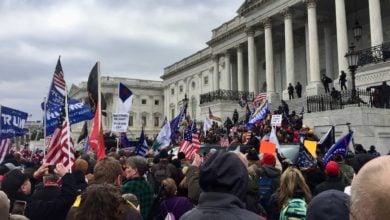The tally is in: Dilma Rousseff of the Workers’ Party (PT) will be Brazil’s first female president. Rousseff is an economist and the former chief of staff of outgoing President Luís Inácio “Lula” da Silva, who threw all of his political weight behind her candidacy.
 Dilma Rousseff |
In the Oct. 31 runoff election, Rousseff won 56 percent of the vote against 44 percent secured by her opponent José Serra of the Brazilian Social Democracy Party (PSDB). Serra is the former mayor of São Paulo, Brazil’s most populous city and the country’s economic capital. An earlier round of votes took place Oct. 3, but a runoff among the top two candidates was required since no one secured the required majority for a victory.
The trajectory of the Workers’ Party
Latin America has experienced a shift to the left in the past two decades—but a shift full of nuances.
In Venezuela, Hugo Chávez was propelled to the presidency by a mass popular movement. Chávez made a lasting connection with the masses by leading a 1992 revolutionary attempt to bring down the bloody government of Carlos Andrés Pérez. The reviled Pérez had violently crushed the Caracazo, a 1989 popular uprising against neoliberal reforms.
In Bolivia, Evo Morales emerged as the progressive leader of Bolivia’s poor at a time of growing popular resistance, particularly among indigenous coca farmers. His defense of the peasants’ right to armed defense against police executions earned him an expulsion from Congress—but also recognition among the disenfranchised masses that would eventually propel him to the presidency.
Unlike Chávez or Morales, Lula did not ride a wave of popular radicalization to electoral victory. In fact, the very record as a militant labor leader that connected Lula to the Brazilian working class turned him into a hated figure among the Brazilian elites in control of the media and the political apparatus. Lula would be defeated in the 1989, 1994 and 1998 elections, coming under fierce attack for his working-class background and lack of formal education—but more importantly, for his party’s pro-labor, anti-neoliberal stance.
To overcome the resistance of Brazilian bankers and foreign investors, Lula abandoned his radical discourse for a platform that would be more palatable to those powerful interests. Lula won the presidency in 2002 after choosing textile magnate José Alencar as his running mate and dropping his promise to cut off payments to the International Monetary Fund, once a centerpiece of the Workers’ Party anti-neoliberal agenda.
The contradictions of the Workers’ Party government reflect this history. The Lula government has made efforts to maintain its base among the poor and working people of Brazil while managing the affairs of the rich. Brazil’s sustained economic growth has helped this juggling act.
Like Lula, Rousseff too came from a radical background, fighting as a Marxist guerrilla in her youth against Brazil’s military dictatorship. Now, she is expected to give continuity to Lula’s combination of business friendly policies and social programs.
Serra would have continued much of the Workers’ Party social programs, but not without significant cuts. Serra’s campaign viciously targeted the Landless Workers’ Movement , which has historically supported the Workers’ Party and has led the occupation of large private farms to push for agrarian reform in Brazil.
Serra: A friend to U.S. imperialism
Serra’s foreign policy would have been his most sharp departure from the Workers’ Party program.
The Workers’ Party government has not broken ties with imperialism. The Brazilian military has been at the head of the U.S.-backed UN occupation of Haiti since June 2004, following the toppling of the Aristide government. Nevertheless, it has fostered friendly economic and political relations with a number of U.S. targets.
Brazil is Iran’s main trade partner in Latin America. In November 2009, Iranian President Mahmoud Ahmadinejad and Lula announced a trade volume goal of $25 billion with increased cooperation in industry, trade, energy and technology. In May 2010, Brazilian and Turkish officials worked out a nuclear fuel swap agreement with Iran when that country’s nuclear energy program was under a hostile attack from the United States.
Relations between Brazil and Venezuela have grown stronger under Lula. Between 2002 and 2009, Brazilian exports to Venezuela jumped 494 percent to $3.6 billion. In 2006, Chávez and Lula agreed to jointly develop an oil refinery in Brazil. A Brazilian pronouncement against Venezuela would have been a boost to Washington’s campaign to demonize Chávez for allegedly providing safe haven to Colombian revolutionaries in the FARC—but such a pronouncement never came. (Bloomberg, Aug. 5)
The Lula administration has rejected the slanderous accusations of political repression leveled by imperialism against the Cuban government and Washington’s deification of counterrevolutionary Cuban prisoners. Brazilian Foreign Minister Celso Amorim has said real change in Cuba is in the hands of the United States, echoing international calls for an end to the blockade. (BBC News, March 11)
If elected, Serra would have undone these friendly relations and brought Brazil’s foreign policy closer to U.S. interests. Relations with Venezuela, Bolivia, Cuba and Iran would have been severely weakened or broken. (Venezuela Analysis, Aug. 20)
Foreign investors would have panicked at a Workers’ Party victory 12 years ago, but the calm that reigns now is evidence of the business friendly stance of both parties. Rousseff has already assured investors that government spending will be kept under control, and it is quite possible that cutbacks in social spending will take place under her government—especially if the boom experienced by the Brazilian economy should falter.
The differences between the leading Brazilian parties are not to be neglected—and are particularly important for those countries depending on political support to fend off imperialist aggression—but the systemic problems faced by Brazil’s workers will not be solved through the ballot box. To that end, left and progressive forces must remain independent of business interests and use elections not as a means to political office but as an instrument for struggle and the radicalization of the masses.





